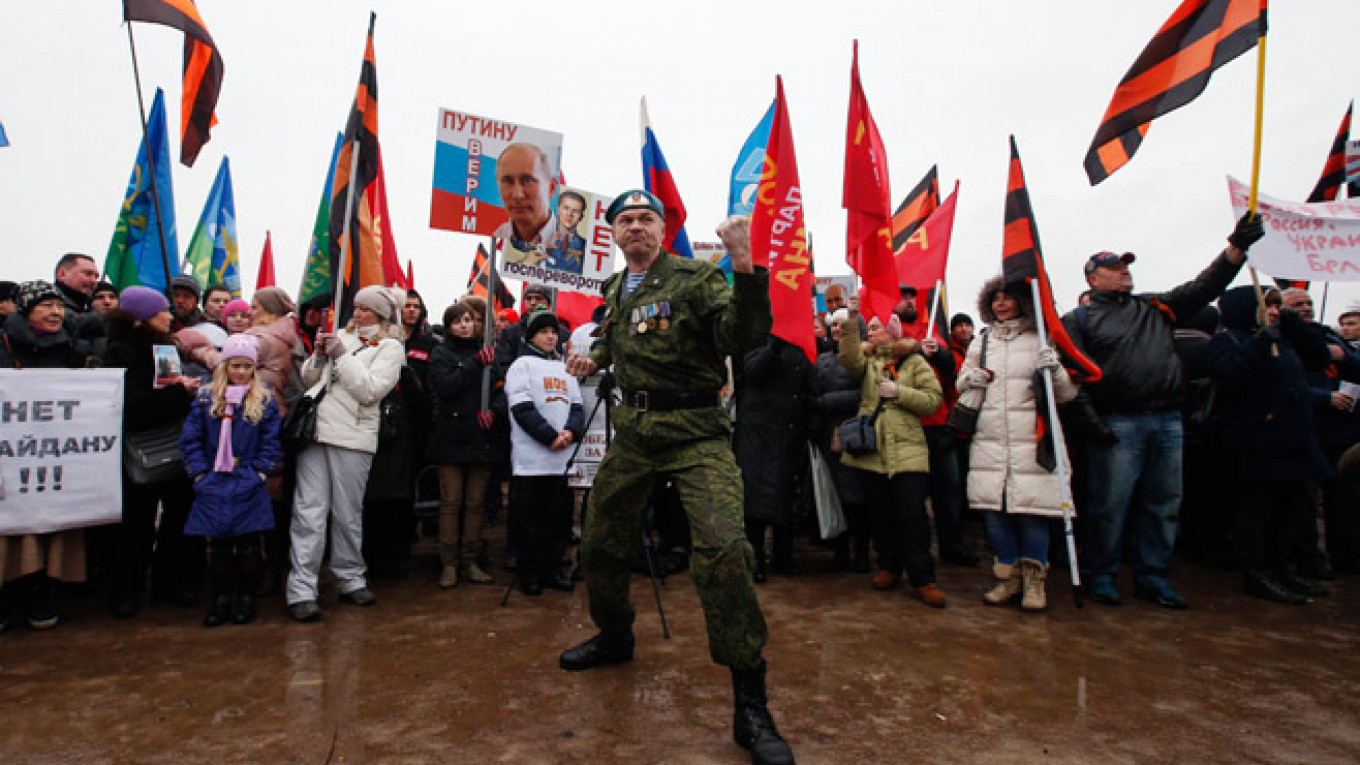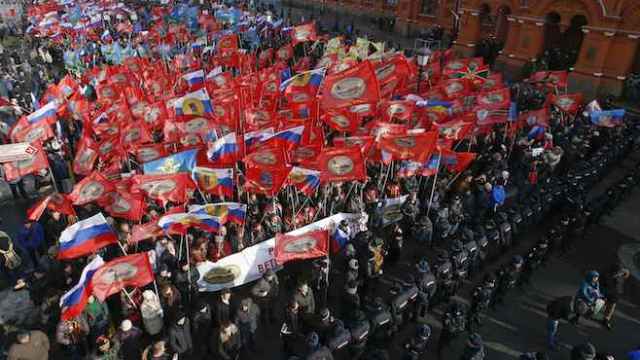As tens of thousands gathered in central Moscow on Saturday for the “Anti-Maidan” rally, the Russian public was asked to swallow an unsavory pill: The notion that Russia is in such danger from outside forces that its own security forces are not enough to prevent a coup d'etat, and that Russia needs a backup team of aging B-list celebrities with a catchy name to help fight off the West.
See the Photo Gallery: Russians Rally at Anti-Maidan March
Russia already has the framework in place to prevent any popular uprising, even one not orchestrated by outside forces. That became clear with the case against Alexei Navalny, who was not only sidelined from the opposition movement thanks to a flurry of criminal cases launched against him, but also discredited in the eyes of many activists. The imprisonment of his brother Oleg last December was likely enough for many other activists to throw in the towel as well.
The rally organized by the Anti-Maidan movement (See story, page 2), whose stated purpose is to prevent “color revolutions” in Russia, makes any sane person ask: What could a rag-tag crew of cultural figures possibly do to prevent a revolution that the Federal Security Service, the GRU and numerous other security agencies couldn't? After all, isn't it the job of these agencies to preserve stability? Why bother having counterintelligence agents at all if you need minor celebrities to do your job for you?
But thinking critically about these issues would mean missing the point. This movement spearheaded by Federation Council member Dmitry Sablin, Night Wolves biker gang leader Alexander "the Surgeon" Zaldostanov, and mixed martial arts fighter Yulia Berezikova could clearly never prevent any uprisings in Russia.
That simply is not within Anti-Maidan's competencies. But it can put on a flashy show to draw as many people into its ranks as possible in a bid to make fear of the outside world mainstream. It does not seek to prevent uprisings; it seeks to malign members of the opposition, create the impression that Russia is under siege from the West, and present President Vladimir Putin as the solution — all in one fell swoop.
Saturday's rally was the first manifestation of all three things. Signs vilifying U.S. President Barack Obama and opposition activists like Alexei Navalny and Boris Nemtsov were in abundance, while placards saying "Putin Won't Allow Maidan in Russia" were handed out near metro stations.
Reports abounded of students being paid to attend, and state workers being forced to, making it clear that organizers knew they had to make it appear to be a sold-out show.
Many demonstrators at the rally seemed convinced that Russia's government was at direct risk of being overthrown.
"We, the people, must fight for our country's independence from America. That is why I came," said Svetlana, who declined to give her surname. She said she also planned to attend an upcoming referendum for Russia's independence.
When asked who was in control if Russia was not presently independent now, she responded as though the answer were obvious: "The U.S. Who else wrote our Constitution when Yeltsin was drunk? American 'aides.' The same people working in Ukraine now."
Svetlana was not in the minority. Many other demonstrators voiced the notion that the United States had not only been responsible for the bloodshed in Kiev one year ago, but had also meticulously infiltrated Russia using members of the political opposition.
While conspiracy theories are nothing new, the Anti-Maidan movement's purpose is to make them the norm.
It's no surprise that Moscow authorities sanctioned the rally — held in the very center of the city — just as it's no surprise that the protest was crawling with state television reporters.
Nor is it a surprise that for perhaps the first time in recent history, Moscow police overestimated the turnout to a major protest rally, putting attendance at 35,000 while many journalists put it in the ballpark of 20,000-25,000.
If there are enough people congregated in one place shouting, "Fire! Fire!" one might actually start to believe there is a fire.
And what better time than now, when Russia is stuck in the bowels of an economic crisis, to create a bogeyman for the people to stand united against? What better time than now, when ordinary Russians are starting to feel the effects of inflation and rising food prices?
These are precisely the sort of conditions that make a country ripe for popular protests — so what better way to nip that in the bud than by convincing the people that protests are a creation of the enemy, that voicing discontent with the government would be playing right into their hands?
Another rally was held over the weekend to mark the one-year anniversary of the protests that overthrew Kremlin-backed President Viktor Yanukovych. But that protest, held in Kharkiv on Sunday and attended by about 500 people, was not put on as some sort of elaborate show to manipulate public consciousness. It was not staged to direct the public's rage at an abstract bogeyman.
That rally was tainted by very real bogeymen, as the relatives of three people killed by a bomb blast in the middle of the march can attest. Two policemen were killed at the scene, and a 15-year-old teenager died later in the hospital, when the peaceful protest was interrupted by an explosion that Ukraine's Interior Ministry suspects was a terrorist attack. At least another 15 were wounded in the blast.
Contact the author at [email protected]
A Message from The Moscow Times:
Dear readers,
We are facing unprecedented challenges. Russia's Prosecutor General's Office has designated The Moscow Times as an "undesirable" organization, criminalizing our work and putting our staff at risk of prosecution. This follows our earlier unjust labeling as a "foreign agent."
These actions are direct attempts to silence independent journalism in Russia. The authorities claim our work "discredits the decisions of the Russian leadership." We see things differently: we strive to provide accurate, unbiased reporting on Russia.
We, the journalists of The Moscow Times, refuse to be silenced. But to continue our work, we need your help.
Your support, no matter how small, makes a world of difference. If you can, please support us monthly starting from just $2. It's quick to set up, and every contribution makes a significant impact.
By supporting The Moscow Times, you're defending open, independent journalism in the face of repression. Thank you for standing with us.
Remind me later.






